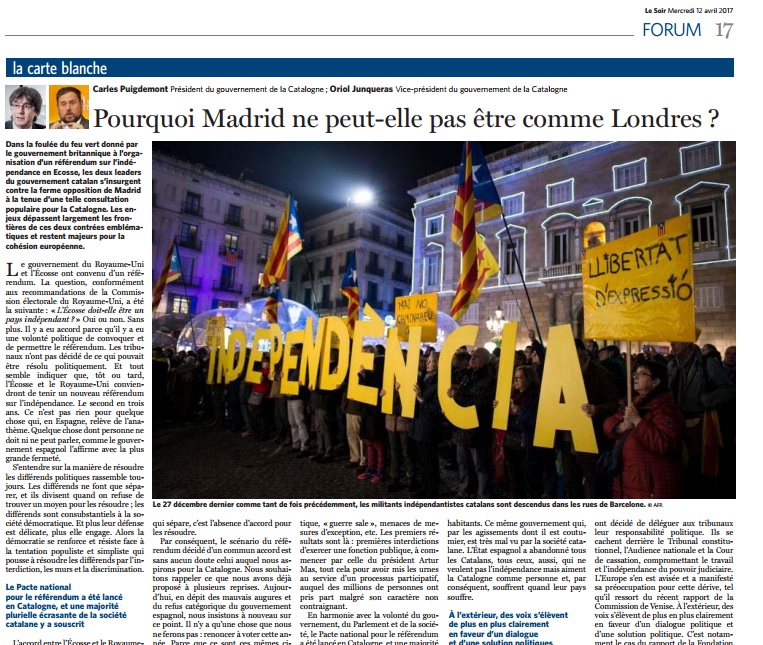13.04.2017 - 08:56
“The only thing we won’t give up on is voting this year,” warn Catalan President, Carles Puigdemont and Catalan VP, Oriol Junqueras, in an article in ‘Le Soir’. Both Catalan leaders made it clear in the main French-language newspaper in Belgium that “differences don’t tear us apart, but the lack of an agreement to solve them does”. In this vein, they lament the Spanish Government’s refusal to open a dialogue and accuse it of “having abandoned all Catalans, including those who don’t support independence” by interfering with the citizens’ right to vote and express their opinions. Thus, their aim is for an agreement such as the one reached between Scotland and the UK. “It is ridiculous for the Spanish Government to decide Catalonia’s future instead of Catalan citizens deciding for themselves,” they say.
The Catalan Government will keep its commitment to call a referendum later this year “because the citizens themselves are demanding the right to express their opinion by answering a clear and simple question,” Puigdemont and Junqueras sustain. The article, titled ‘Why can’t Madrid be like London?”, explains the Spanish Government’s “worrying lack of willingness to open a dialogue” on the Catalan situation.
Both leaders believe that “the attitude of the Catalan Government and that of the Catalan Parliament” are “undeniably” similar to that of Scotland, since they are both willing “to open a dialogue and reach agreements on the referendum”. However, Spain’s position is “fundamentally different” from the UK’s.
Puigdemont and Junqueras also lament “the judicialization of politics, the dirty war and the state of emergency’s threats” and criticize the Spanish Government for “hiding behind” the courts and “compromising the judiciary’s work and independence”.
As evidence, they refer to former Catalan President, Artur Mas’ ban from public office for having allowed a non-official vote on independence in 2014 and warn that the usage of the court to respond to political matters “is worrying to” Europe.
The article also emphasized the creation of the National Alliance for the Referendum which gathers together “a plural majority of the Catalan society, including economic and social actors” and emphasizes that “80% of Catalans want to be asked about Catalonia’s political future”.
They both insist on the high turnout for the eventual referendum forecasted by many polls and emphasize their willingness to accept the outcome. “We are democrats, first and foremost,” they state.
“Politics have been on the agenda for a long time now,” they say, pointing to the need to “listen and talk”. “We are already at the negotiating table. We are open to discuss everything, without exception. We are willing to follow the UK’s and Scotland’s path, the path of agreement. How long is it going to take for the other guests to arrive?”, they conclude.



